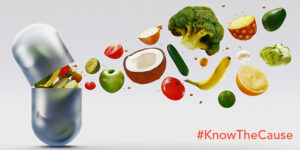

| Those of us who have been interested in health for a while are used to looking for certain things on labels. “Certified Organic” is one of the more critical things to look for when you are (obviously) trying to shop organic. |
If you get the USDA Certified Organic label, you know that the food you are getting is in compliance with the USDA’s standards for organic farming. And even though regulatory agencies often miss the mark, this is a good label that you can put some trust in.
Marketers are always coming up with new ways to encourage people to try their products, and don’t think for a moment that they don’t have a pulse on the newest health trends. This hardly bears repeating; a stroll through even the largest box retail supermarkets will reveal items listed as “Fortified with…”, “Only XX Natural Ingredients…”, or some other phrase intended to assure the consumer that they aren’t buying a box, package or bottle loaded with stuff cooked up in a lab. But most marketers, at least in my humble opinion, are masters of deception, and one of the words they commonly thrown around is the word “natural”.
Let me be clear; I think going the “natural” route is always best, and by this I mean a few things. I think foods grown in a natural way, i.e., on an organic farm, or cows fed their natural diet of grass, etc., is always best and safest. Obviously, I think “natural medicine”, or medicine that tries to avoid manmade chemicals in favor of medicines harvest from the natural world, is a great health strategy. But, there are a few things about the labeling and marketing of foods as “natural” that really get under my skin, because many lay people fall for this marketing ploy when they are new to healthy living and trying to buy food that isn’t garbage.
First of all, the natural label does NOT equal organic. Foods grown with any and every chemical can still be labeled as “natural”. If you are buying “natural” labeled chicken, for example, that doesn’t mean that the chicken was free-range, or grown without hormones or antibiotics. “Natural” is a free and easy word to throw on a label that, at least in the consumer’s mind, relieves them of any doubt about the safety or cleanliness of a product. After all, who in their right mind would want food that unnatural as opposed to natural? The word brings with it a connotation meant to lure consumers.
Second of all, “natural” doesn’t necessarily imply “safe”. I’m not saying that the foods labeled natural aren’t safe; I’m just trying to underscore the uselessness of the label. Here are some other things that are all natural: uranium, hemlock, rattlesnakes (notably their venom), aflatoxin B-1… You are beginning to get the picture. It’s not really any secret that fruits and vegetables and animals grow in the “natural” world (although, with the advent of factory farms and farming, we are quickly escaping that notion), but we don’t need the word “natural” slapped on the labeling of factory meat to project the image of some idyllic farm into the mind of the consumer when the animal wallowed in filth for its entire life. That’s deception by marketing, plain and simple.
Third, the “natural” label doesn’t imply healthy, either. A stroll down the cereal aisle is nearly comical for things like this; makers of sugary cereals will stop at nothing to peddle their wares, even labeling that garbage as “All Natural” or “Heart Healthy”.
Next time you are shopping, be sure to pay a bit closer to the label on your food; buying a food that is “all natural” doesn’t necessarily mean it is Kaufmann 1 friendly, or even healthy, for that matter.
Doug Kaufmann has written many books that cover a full range or health issues. Find out which of his books best suits you by clicking the button below.
Doug Kaufmann developed his diet after years studying the clinical effects of pathogenic fungi on the body. Fungi and yeasts can become parasitic organisms on and inside our body, causing health problems that can be difficult to diagnose. Learn more about the Kaufmann Diet, change your life and know the cause.
We encourage all visitors to this site to take some time and study these technical articles prior to initiating lifestyle changes, including dietary changes and to do so with their physician’s awareness and approval. The articles posted in this link are scientific and with few exceptions are taken from medical journals familiar to healthcare workers.
Looking for help assembling antifungal Kaufmann Diet approved recipes for breakfast, lunch or dinner? We have several videos, books and recipe write ups here on Know the Cause that will help your health journey. The recipes in this section are so good, you’ll feel like you’re indulging. No sacrifice needed! Enjoy.
© 2024 Mediatriton Inc. All Rights Reserved • Website by Skynet Solutions